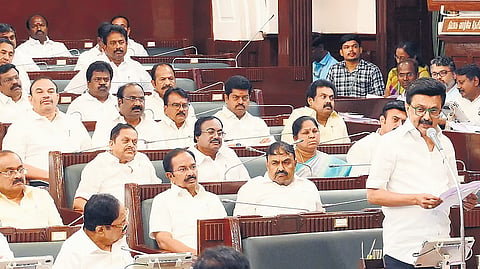

CHENNAI: The state Assembly on Thursday passed a Bill allowing the Tamil Nadu Public Service Commission (TNPSC) to manage the recruitment of non-teaching staff for 22 state universities.
The Bill amends the TN Public Service Commission (Additional Functions) Act, 2022, which empowers the TNPSC to conduct recruitment for various government departments and undertakings.
Until now, the recruitment for non-teaching positions in these state-run universities was managed by the respective university administrations.
The Bill stated that the move would establish a more uniform, efficient, professional and transparent system for recruiting non-teaching staff at the universities.
It would also make it easier for job seekers from rural areas to apply for such positions, while relieving universities of the cumbersome task of conducting their own recruitment drives.
Bill passed to extend tenure of SOs in rural local bodies
The Assembly also passed a Bill to amend the TN Panchayats Act, 1994, to extend the term of office of special officers (SOs) appointed to administer village panchayats, panchayat union councils and district panchayats till January 5, 2026, or until the first meeting of the local bodies after the general elections.
While the rural development department had issued an order in this regard in July, the Bill was now passed in the Assembly.
According to the Bill, the government is finalising proposals to expand municipal corporations, municipal councils and town panchayats by including certain adjoining village panchayats in 28 districts.
Only after the delimitation and reservation processes are completed after this amalgamation, elections for these rural local bodies can be notified. A total of 9,581 village panchayats, 314 panchayat union councils and 28 district panchayats are being run by the SOs.
The tenure of elected representatives of panchayats in these 28 districts expired on January 5 this year.
As elections could not be conducted before that date, the government amended the TN Panchayats Act, 1994, to appoint SOs to administer these bodies until July 5.
The Act was now amended to extend the tenure of SOs till January 2026 or until the elections are held.
Tender exemption clause of 1998 Act scrapped
The state government has moved to tighten its tendering system by scrapping the exemption clause in the TN Transparency in Tenders Act, 1998, that allowed select procurements to bypass the standard open tender process.
An amendment passed on Thursday removes Section 16 of the law, which previously permitted direct procurement in limited circumstances such as emergencies, ensuring compatibility, or sourcing from state-owned or non-commercial entities.
The provision also allowed purchases through the Government e-Marketplace (GeM) platform without adhering to sections 9 and 10 governing open tendering procedures.
According to the Statement of Objects and Reasons, Section 16 explicitly exempted procurements made through the GeM special purpose vehicle from the application of sections 9 and 10 of the Act.
This exemption covered purchases through mechanisms such as rate contracts, online bidding, online reverse auctions and any other method notified by the government.
The government said the exemption had become redundant as TN already operates its own e-procurement portal (tntenders.gov.in).
This apart, the Assembly on Thursday also introduced a Bill to amend the TN Dr Ambedkar Law University Act, 1996, which sought to amend relevant rules that disqualified the deaf-mute from holding authority positions in the university.
The proposed changes also seek to update a penal reference in the Act to align with the new Bharatiya Nyaya Sanhita, 2023.
